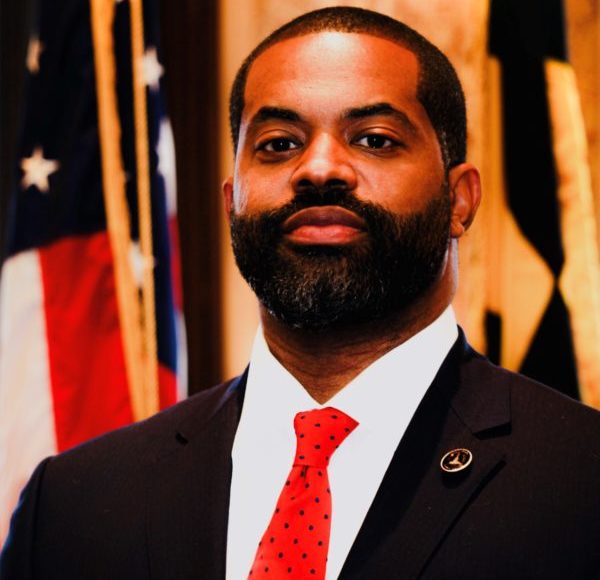With a gubernatorial race, recreational cannabis legalization, local police control oversight and a media boss-funded term limits measure all on the Election Day ballot yesterday, you might have missed the handful of electoral developments that reflected the importance of tech to Baltimore’s economy and governance.
But tech and entrepreneurship were, indeed, embedded within several of the questions and choices that Baltimoreans had to vote on this year — and in more direct ways than the kind of trickle-down effects we might expect when Democrat Wes Moore heads to Annapolis to make history as Maryland’s first Black governor.
From key candidates and prospective winners in the race for two open Board of School Commissioners seats to a pair of ballot questions that could impact the way we use our internet and communications infrastructure, here are just some of the ways that the topics we most frequently cover at Technical.ly manifest in yesterday’s races.
Ashley Esposito takes first place in close school board race

To be sure, the first election for two open spots on the City of Baltimore’s public school board has yet to fully conclude, with the State Board of Elections noting as of press time that 294 of 296 precincts have reported results. Still, the current reports suggest that Ashley Esposito, a former IT programmer for the State of Maryland, earned first place with 28.9% of the vote, or 47,786 total votes.
Patterson High School educator Kwame Kenyatta-Bey followed close behind at 27.5%, while onetime Google DEI recruiter-turned-prominent-critic April Christina Curley and former Digital Harbor High teacher Salimah Jasani nabbed 22.5 % and 20.26%, respectively.
If the remaining results do not dramatically shift the results, then that means Esposito — one of three aforementioned frontrunners with tech connections, as well as the only working technologist of the bunch — and Kenyatta-Bey will be sitting on the school board next year. While neither they nor Curley immediately returned Technical.ly’s request for comment, Esposito told us before that the education pipeline matters for Baltimore tech’s future.
“When I see Baltimore as a whole, I see our economy going in the direction of becoming like a tech hub,” she said at the time. “If our kids aren’t ready to fill those roles, they’re going to be left behind and people from the outside of Baltimore city are going to come in and take those jobs.”
Question E en route to banning the sale of the underground conduit system
While this city-specific ballot question was far less controversial than the Sinclair boss-funded campaign behind Question K, whose proposal for a charter amendment setting various elected positions’ term limits passed with over 70% of the vote, Question E could have serious implications for how Baltimore’s communications infrastructure operates.
In short: the question put to voters another charter amendment that would prohibit “the sale, transfer, or franchising of the City’s underground conduit system for cables, wires, and similar facilities,” according to the state elections board. As The Baltimore Banner reported last month, back when Mayor Brandon Scott’s administration was planning a telecom consulting contract that prompted some City Council members’ critique, the aging conduit system requires maintenance that mayoral administration spokesperson James Bentley said was outpacing the profit it brought in from leases to Baltimore Gas & Electric and others.
The ballot question shone a light on a broader debate about whether such infrastructure should be privatized or not. For amalia deloney, a VP and director of digital equity for the Baltimore-based Robert W. Deutsch Foundation, the 76.1% of pro-amendment voters “took an important step” toward protecting a valuable public resource.
“This decision rightly recognizes that conduit is a critical aspect of municipal infrastructure that must be secured for long-term public benefit,” she told Technical.ly via email. “With this vote, residents have said that our digital future demands we don’t throw the baby out with the bathwater.”
Voters push the Dante Barksdale workforce development fund further toward existence

City Council President Nick Mosby nabbed a victory when 89.7% of voters chose “yes” on Question G, a charter amendment establishing the non-lapsing Dante Barksdale Career Technology Apprenticeship Fund.
Rooted in Mosby’s own March 2021 legislation and named for a prominent Safe Streets leader who was killed by the gunfire he sought to prevent, the fund would support apprenticeships and related workforce development programs in city schools and community colleges.
Mosby’s deputy director of communications, Candance Greene, said via email that the ballot question’s passage will set in motion a rollout plan that includes a public ordinance from City Council “that lays out the specific implementation of the fund through the proper city agencies and community partners.”
“Once that ordinance is introduced, a committee hearing will be set and held to provide robust discussion on how we get this program off the ground and provide for public feedback,” Greene explained to Technical.ly. “Then, the committee with vote on the final ordinance, which is sent to the Mayor for his signature to become law. Once it is a law, the program will be administered with the funding that has been ‘set aside’ by the passage and creation of the [fund].”
Mosby, who worked as an electrical engineer before entering politics, previously called the fund “the sort of policy prescription that can create transformative change in our city.” Greene noted that Mosby intends “to steward as much tech into the fund’s administration as appropriate.” Overall, Mosby aims for the fund to reduce the kind of poverty-fueled violence that took its namesake, among many others, by offering alternatives to at-risk youth.
“This is one tool that aims to address the many issues we see as the result of underinvestment in the future of our city and its residents,” Greene said.







